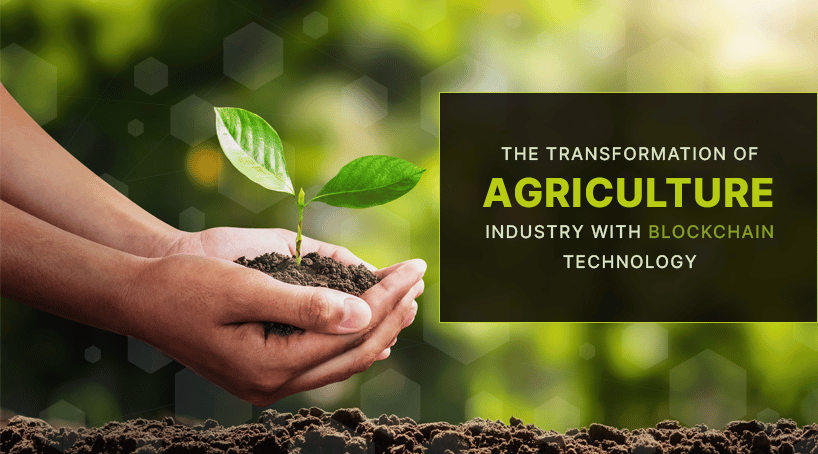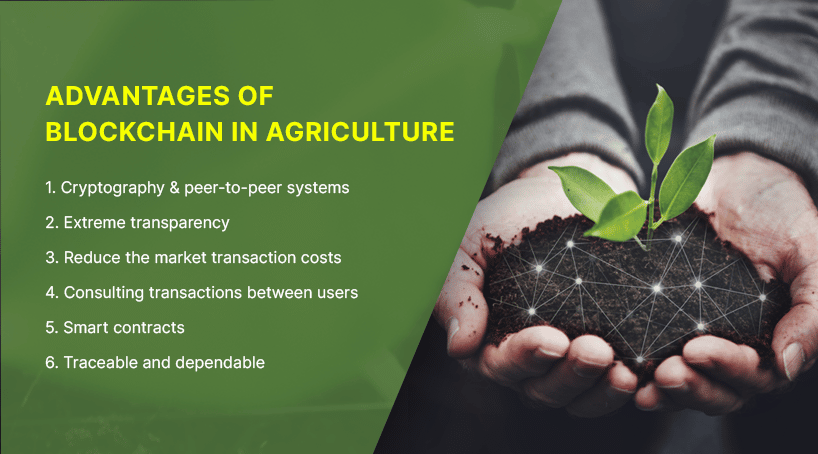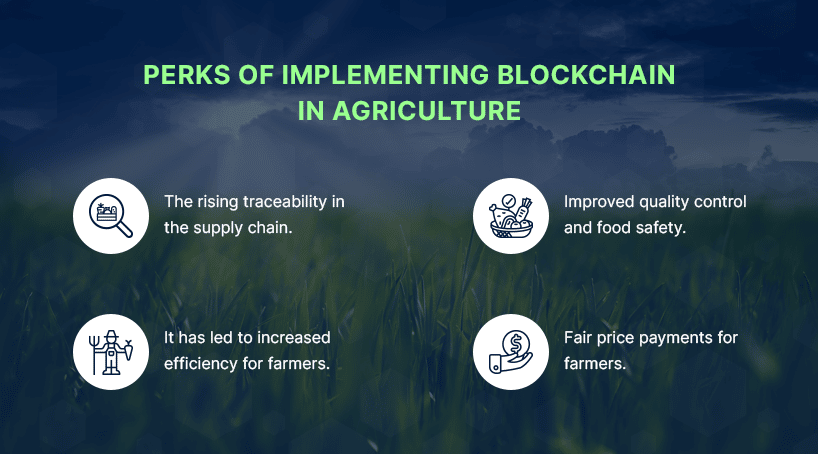- 8 min read
- Jul 6, 2022
- 0

More than 70 percent of households in the Indian countryside are dependent upon agriculture which makes up the largest livelihood in India. In the agricultural field, India has major scope to increase employment opportunities throughout the country. When modernization combines with improved technologies such as Artificial Intelligence and blockchain provide exclusive solutions for agriculture. Modern technologies have a major role to play in the present agricultural ecosystem.
Blockchain technology is rising to be a clear game-changer in the agriculture industry. Not only does it offer accurate data relating to agriculture but also offers tamper-proof inventory, credit scores, as well as food tracking. Nowadays, blockchain has begun to impact the various dynamics of the agricultural industry as well. Blockchain has the potential and gravity to revolutionize. However, it has different challenges involved that require immediate attention. Blockchain technology has different applications to make in agriculture.
Effects of Blockchain in Agriculture
In the agricultural field, blockchain is used to help enhance the quantity of reliable data available in several inventories, agricultural contracts and the distinct state of the farms. Blockchain has distinct types of data security and has serious potential to change the future. As a result of the blockchain in agriculture, it is essential to enhance the quality of the food supply chain. It enables the benefit of several data-driven technologies for helping the distinct era of smart farming. It is a trustable and reliable process of recording data. It assists in smoothing the nature of transactions amidst distinct stakeholders by making things more time when it is amalgamated with the growth of smart contracts.
Transactions of Agriculture Products
The utilization of effective blockchain technology has considerably increased the acquisition and increase sales of agricultural products on several eCommerce platforms. Blockchain assists in amplifying the ultimate efficiency of the agricultural process by reducing the cost of signalling for all sectors and parties indulged in the importance of supply chain management. By administering digital payment solutions with no transaction charges blockchain technology helps in adding to the security of the transactions. The distinct characteristics of blockchain technology have raised confidence in the online buying of agricultural products.
Advantages of Blockchain in Agriculture

In this context, it is relevant to understand the advantages of blockchain in agriculture. Let’s take a look at the distinct benefits of Blockchain in the agricultural industry.
- Due to a lack of central authority, the nature of the transaction mainly alters the trust. Trust is mainly placed in cryptography and peer-to-peer systems.
- In agriculture, blockchain app development enables peer-to-peer transactions through extreme transparency. Thereby it eradicates the requirement of any middlemen.
- Blockchain technology assists in the restoration and improvement of trust among several stakeholders. This will, in turn, reduce the market transaction costs in the long run.
- As a result of blockchain technology, users can now have a solid means of consulting transactions between anonymous users.
- The inclusion of smart contracts has made it easier to track things across a large network. This gives users enough accessibility to detect, report and remain alert to glitches in real-time.
- Inside a blockchain ecosystem, there is more transparency in all transactions. Data collected with the help of this method is traceable and dependable. This, in turn, helps in the development of distinct data-driven insurance choices thereby making farmers less vulnerable to agricultural risks.
Use Cases of Blockchain in Agriculture
Herein we are going to discuss the use cases of blockchain in agriculture are as follows:
- Food supply chain
- Crop and food production
- Management of agricultural finance
- Controlling weather crisis
Food Supply Chain System
When it comes to the blockchain food supply chain, it will prevent any kind of food fraud with the usage of the following techniques:
- The timely distribution of produced crops to food processing companies.
- IoT sensors help to create data and also save farmers’ data.
- Blockchain helps consumers to trace the supply chain operations.
- The retailers and wholesalers receive processed food.
Production of Food And Crop
Blockchain plays important role in altering the way crops or food items are created with a distinct process.
- Data generation and keeping records through IoT devices
- Purification and enrichment of the data that is collected through IoT
- Machine learning algorithms are used to make data more insightful and intuitive.
- Blockchain technology in crops and food is used for storing data and maintaining data security.
Effective Management of Weather Crisis
Blockchain has resolved many weather handling issues with its robust technology. Nowadays, farmers are capable of mitigating weather crises with the effective utilization of the following process as below:
- Farmers are capable of taking precautionary measures.
- The agricultural weather stations are equipped with vital information relating to blockchain technology.
- Crop insurance is easily applicable.
Management of Agricultural Finance
Blockchain is capable of assisting in handling agricultural finance:
- Auditors can conduct audits effectively.
- Sharing of relevant information among stakeholders during different stages of food production.
In this context, it is relevant to implement the usability of blockchain technology in the agricultural sector. Nextbrain is the largest blockchain development company that offers high-end blockchain development services comprising blockchain technology and app development for major industry jargon. The company have a dedicated team of professionals and developers who creates robust blockchain technology for businesses, startups, and enterprises.
Perks of Implementing Blockchain in Agriculture

Following the innovation of blockchain, it is relevant to learn the four benefits of executing blockchain technology in agriculture are as follows:
- The rising traceability in the supply chain.
- Improved quality control and food safety.
- It has led to increased efficiency for farmers.
- Fair price payments for farmers.
Advanced Quality Control And Food Safety
Blockchain has possible benefits in helping farmers:
- Eliminating ineffective processes
- Ensuring optimal quality control conditions.
- Bringing increased transparency to the supply chain.
For a long time, crop failure is considered a prevalent problem faced by farmers throughout the world. This generally happens due to unfavourable climatic conditions like bad weather and poorly scattered rainfall. In order to resolve this, major MNCs have begun to invest in precision agriculture. Thereby, it leads to the creation of IoT devices that enable farmers to monitor factors impacting the crops. The factors mainly involve soil quality, irrigation, and pests.
The devices are connected to a blockchain ledger and the results can be easily updated and viewed in real-time. This enables farmers to make sure that the agricultural process becomes easier.
Increases Opportunity of Traceability In the Food Supply Chain Sector
In recent times, consumer demands for food standards and quality are increasing rapidly as they are becoming keen to acknowledge from where their food is coming. Blockchain technology has readily solved this problem by enabling consumers to acknowledge the source of the food, who planted it and the quality of its freshness. The process is done by scanning the product at every stage while updating data. By means of increasing traceability of the supply chain, it can have a significant impact on things like:
- Eliminating intermediaries of the process
- Fake labelling
- Diminishing food fraud
- Making sure that producers get paid for their efforts
- Allowing customers to acknowledge what they are paying for.
Enhancing traceability will assist farmers by enabling them to update and record the status of their crops. Additionally, it can track them through the process of planting, harvesting, storage and delivery. The app can be utilized to check the actual status of a product at all times and make adjustments. Blockchain technology will enable farmers for storing all their data in one place and be conveniently accessible to those who require it. It simplifies the entire process and saves important time and energy.
- Blockchain technology helps to keep track of the number of agricultural problems.
- The business goals are effective to reach different objectives.
- The number of distinct crop varieties that were planted and their performance.
- The entire employee schedule, the payment of the employee and counting hours they worked.
- Including incomes and expenses.
Fair Price Payments For Farmers
There is a wide range of problems that make it challenging for farmers to get paid for the process and what they produce. The traditional method of providing payments to farmers is difficult and leads to many weeks for farmers to receive full payment for their goods. The traditional payment mechanisms are generally used to transfer payments and take a significant amount of their money.
However, this is not the present scenario as blockchain-based smart contracts work by triggering payments automatically. Additionally, it does not charge any extra transaction fees. This is relevant as farmers are capable of getting complete payment for their goods as soon as they deliver the goods. Thereby, they are getting fair payment without a relevant section taken away in the process.
Final Conclusion: Future of Blockchain in Agriculture
Blockchain is one of the best growing technology which has begun to revolutionize many industries. As per the latest report it has been seen that over 2.4 trillion dollars is the worth of the global agricultural industry and has more than one billion people involved in agriculture throughout the world. After observing the above perspectives it is quite certain that blockchain technology has major applications in the agriculture industry. As the leading blockchain development company in Toronto, Nextbrain always strives to create user-friendly blockchain app platforms that are highly interactive and scalable catering to business needs. To know more about blockchain technology, connect with experienced professionals.
